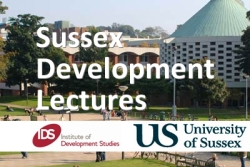About the lecture:
The current global economic crisis represents yet another crack within neo-liberalism’s foundational claim, that markets are inherently more efficient than states at allocating resources and delivering human development. In this context of ideological crisis the question of what eventually replaces neo-liberalism as the hegemonic development discourse inevitably arises. Proponents of Statist Political Economy, such as Ha-Joon Chang, Robert Wade and Alice Amsden, influenced by the father of the ‘infant industry’ argument, Friedrich List, have a great opportunity to replace neo-liberal theory, as they have illustrated the centrality of states in achieving catch-up development. However, while these authors present List as progressive, a closer look at his work suggests otherwise. This lecture re-visits Karl Marx’s original critique of List in order to highlight the regressive bias inherent in the latter’s work, including his adherence to Eurocentric view of history. It argues instead, that Marx provided an alternative vision of human development that is increasingly relevant in this time of global crisis, rooted in the political economy of labour and a dialectical conception of history.
About the speaker:
Dr Selwyn joined the International Relations department at the University of Sussex in January 2009 after teaching at the University of Southampton (2006-2008) and the LSE (2004-2006). He recieved his PhD from the School of Oriental and African Studies, University of London in 2007 on the subject of ‘Export Grape Production and Development in North East Brazil’ which investigated how the Brazilian state, local public and private institutions and firms collaborated to implement a successful upgrading strategy which has resulted in North East Brazil becoming Brazil’s main grape exporting region. He has continued researching the processes of economic development in the region, conducting additional fieldwork in 2008. His research also investigates how the export boom impacts on local level development, in particular on local labour standards, conditions of work and pay rates, gendering of work and women’s participation in rural trade unions.
